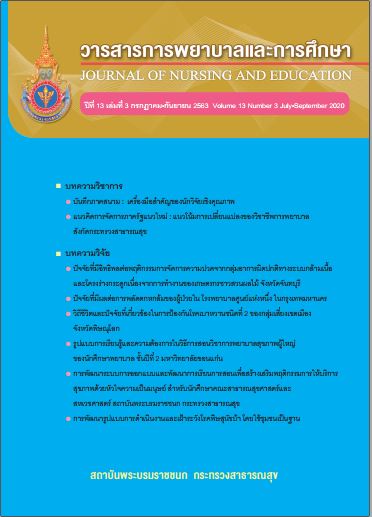การพัฒนาระบบการออกแบบและพัฒนาการเรียนการสอน เพื่อสร้างเสริมพฤติกรรมการให้บริการสุขภาพด้วยหัวใจ ความเป็นมนุษย์ สำหรับนักศึกษาคณะสาธารณสุขศาสตร์ และสหเวชศาสตร์ สถาบันพระบรมราชชนก กระทรวงสาธารณสุข
The Development of Instructional Design and Development System to Enhance the Humanized Care Behaviors for Students of Faculty of Public Health and Allied Health Sciences, Praboromarajchanok Institute, Ministry of Public Health
คำสำคัญ:
ระบบการออกแบบและพัฒนาการเรียนการสอน, พฤติกรรมการให้บริการสุขภาพด้วยหัวใจความ เป็นมนุษย์บทคัดย่อ
การวิจัยและพัฒนานี้ มีวัตถุประสงค์เพื่อ ศึกษาแนวปฏิบัติที่ดี สร้างระบบ และศึกษาผลการใช้ระบบการ
ออกแบบและพัฒนาการเรียนการสอนเพื่อสร้างเสริมพฤติกรรมการให้บริการสุขภาพด้วยหัวใจความเป็นมนุษย์
ที่ประกอบด้วย จิตบริการ (Service Mind) การคิดเชิงวิเคราะห์ (Analytical Thinking) และการมีส่วนร่วมของ
ผู้รับบริการ (Participation) เรียกรวมกันว่า “เอสเอพี” โดยกลุ่มตัวอย่างที่ใช้ศึกษาแนวปฏิบัติที่ดีด้วยวิธีการ
แลกเปลี่ยนเรียนรู้ คือ อาจารย์ 222 คน จากประชากร 642 คน ซึ่งกำหนดโดยใช้ตารางของ ทาโร ยามาเน่
และกลุ่มตัวอย่างที่สัมภาษณ์เชิงลึก ได้แก่ อาจารย์ 15 คน เลือกแบบเจาะจงจากการแนะนำอ้างอิงแบบลูกโซ่
และกลุ่มตัวอย่างที่ใช้ศึกษาผลการใช้ระบบฯ ได้แก่ อาจารย์ 7 คน ที่สมัครใจเข้าร่วมการทดลองใช้ระบบฯ และกลุ่มตัวอย่างที่รับรองระบบฯ ได้แก่ ผู้เชี่ยวชาญ 5 คน ได้มาโดยวิธีการแนะนำอ้างอิงแบบลูกโซ่ เครื่องมือที่ใช้
ในการวิจัย ประกอบด้วย ประเด็นการแลกเปลี่ยนเรียนรู้เพื่อศึกษาแนวปฏิบัติที่ดี แบบสัมภาษณ์เชิงลึก คู่มือ
การออกแบบและพัฒนา ใบงาน แบบประเมินผลการออกแบบรายวิชา และแบบรับรองระบบฯ วิเคราะห์ข้อมูล
โดยการวิเคราะห์เนื้อหา หาค่าเฉลี่ย และค่าดัชนีความสอดคล้องของผู้เชี่ยวชาญ
ผลการวิจัยพบว่า ระบบการออกแบบและพัฒนาการเรียนการสอน ประกอบด้วย 7 องค์ประกอบ ได้แก่
1) เนื้อหาวิชา 2) วัตถุประสงค์การเรียนรู้ 3) กลยุทธ์การเรียนการสอนและกิจกรรม 4) บทบาทผู้สอนและผู้เรียน
5) สื่อการเรียนการสอนและทรัพยากรการเรียนรู้ 6) สภาพแวดล้อมการเรียนรู้ และ7) วิธีและเครื่องมือประเมิน
พฤติกรรม ส่วนขั้นตอนของระบบมี 5 ขั้นตอนหลัก 28 ขั้นย่อย ผลการทดลองใช้ระบบฯ พบว่า ในภาพรวม
อาจารย์มีความสามารถในการออกแบบรายวิชา ให้เสริมสร้างพฤติกรรมการให้บริการสุขภาพด้วยหัวใจความ
เป็นมนุษย์ โดยเฉลี่ยทุกด้านอยู่ในระดับดีมาก (Mean = 2.71) เมื่อพิจารณารายด้าน พบว่าอาจารย์สามารถ
วิเคราะห์ กำหนดและเขียนวัตถุประสงค์เชิงพฤติกรรมระดับหัวข้อได้คะแนนมากที่สุด (Mean = 2.89) รองลง
มาคือ วิเคราะห์และออกแบบกลยุทธ์และกิจกรรมการเรียนรู้ (Mean = 2.80) ด้านที่ได้คะแนนน้อยที่สุด ได้แก่
วิเคราะห์และกำหนดทรัพยากรการเรียนรู้ (Mean = 2.60) ผู้เชี่ยวชาญมีความเห็นว่าระบบฯ มีความเหมาะสม
(Mean = 0.96) และรับรองว่าระบบฯ อยู่ในเกณฑ์ดีมาก (Mean = 3.60)
เอกสารอ้างอิง
(2019, 5 April). Government Gazette 136, 43,
p40-65. (in Thai)
2. Praboromarajchanok Institute. Strategic Plan of
Praboromarajchanok Institute Medium-term
Strategic Plan 5 years, 2020-2024, Praboromarajchanok institute, 2020. (in Thai)
3. Keawkalayasikkhalai, Educational Development
Section, Praboromarajchanok Institute. The
Learning Experience of Mind Service with the
Human Heart under the Virtual Family System.
Bangkok: Klungnana-wittaya Printing, 2018. (in
Thai)
4. Taro Yamane. Statistics: An Introductory
Analysis. 3rd ed. New York: Harper and Row
Publications, 1973.
5. Natakuatoong, O. Instructional Design System:
System Approach in Education. Nonthaburi:
Sukhothai Thammathirat University, 2020. (in
Thai)
6. Gerlach, V. S. & Ely, D. P. Teaching and Media:
A Systematic Approach. Upper Saddle River,
NJ: Prentice Hall, Inc, 1971.
7. Kemp, J. Instructional Design: A Plan for Unit
and Course Development. Belmont, CA:
Fearon Publishers, 1977.
8. Reiser, R. A. What field did you say you were
in? In R. A. Reiser & J. V. Dempsey (Eds.).
Trends and Issues in Instructional Design and
Technology. 4th ed. NY: Pearson Education,
Inc., 2017.
9. Morrison, G. R., Ross, S. M., Kemp, J. E., Kalman, H. K., & Kemp, J. E. Designing Effective
Instruction. 7th ed. Hoboken, NJ: Wiley, 2012.
10. Seechaliao, T. A Proposed Model of Instructional Design and Development based on
Engineering Creative Problem Solving Principles to Develop Creative Thinking Skills of
Undergraduate Engineering Students. Bangkok: Chulalongkorn University, 2008. (in Thai)
11.Thangkabutra, T. Development of A Model of
Blended Learning Instructional Design using
Cognitive Maps to Increase Critical Thinking
Ability for Undergraduate Students. Bangkok:
Chulalongkorn University, 2009. (in Thai)
12. Udomseth, K. Development of A Flipped Learning Instructional Design Model based on
TPACK Framework and Elaboration Theory for
Secondary School Teachers under Office of
the Private Education Commission. Bangkok:
Chulalongkorn University, 2015. (in Thai)
13. Duchastel, P. C. & Merrill, P. F. The Effects of
Behavioral Objectives on Learning: A Review
of Empirical Studies. Review of Educational
Research, 1973; 43(1): 53-69.
14. Office of the Civil Service Commission. A
Manual for Determination of Performance in
Civil Service: Core Competencies Guide. Nonthaburi: Prachum Chang Co.,Ltd., 2010. (in
Thai)






